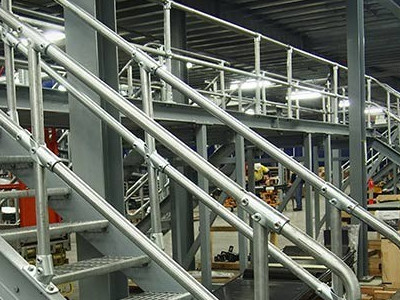Hand Rail
Hand Railing

Types of Handrails
The two widely used Handrail Systems are
1) Tubular Handrail Systems
These are lighter than solid types, having similar load carrying capacities, used in normal weather conditions.
2) Solid Forged Handrail Systems
These are heavy duty type handrails and normally used for offshore requirements and corrosive weather conditions.
Company Welded Handrails
These types of handrails where ball & shank are joined by precision welding.
Tabular Handrails Standards
» Flat Base type (FB) at a design height of 1100 mm (GS1)
» Side Base type (SB) at a design height of 1200 mm (GS2)
» Flat Base type (FB) at a design height of 1000 mm (GS4)
» Side Base type (SB) at a design height of 900 mm (GS5)
Handrails Parameters
» Handrail Height (A)
Form 900 mm to 1200 mm
» Ball Diameter
Ball Diameter is generally taken as Dia form 60 mm to 85 mm
» Ball Centre (B)
Ball Centre is the vertical center to center distance between two balls normally it is from 450 mm to 550 mm.
Depending upon 3 categories of loads and shank OD, the maximum center-to-center distance between the two consecutive shanks (Pitch) should be as follows
Applications
» Fertilizer Plants |
» Chemical Plants |
» Oil & Gas Refineries |
» Power Plants |
» Sugar Mills |
» Pharmaceutical Factories |
» Cement Plants |
» Sewage Treatment Plants |
» Tank walk ways & stairs |
» Mezzanine Floors |
» Side walks |
» Overhead crane cages |
» Railway service walks |
» Conveyor systems |
» Engineering Design Service |
» Industrial Applications |







